Police ethics panel reveals San Francisco law enforcement
stymied by leadership failure, communication breakdown, low morale,
politics
and mistrust
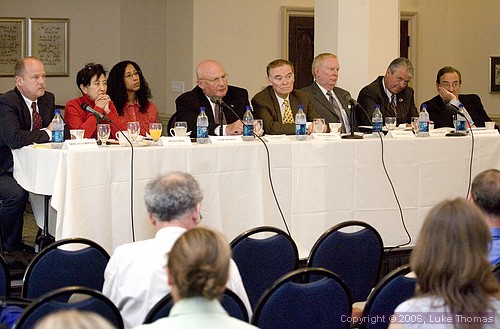
Members of a "Police Ethics" panel convened for a two-day
summit
at Lone Mountain college. The eight member panel will deliver
its findings and recommendations within 60 days.
Photo(s) by
Luke Thomas
By Pat Murphy and Luke
Thomas
Copyright fogcityjournal.com 2006
June 5, 2006
Clearcut police leadership no longer exists in San Francisco,
a fact-finding panel on police ethics heard last week.
Those who shape the San Francisco Police Department stalemate
each other with open contempt, or wait for consensus from those
who don't find it.
The mayor fails leadership by announcing consensus efforts that
don't coalesce, the Police Commission is driven by politics, the
Office of Citizens Complaints (OCC) solicits complaints outside
its authority, and the Police Department stymies investigation
of police officers.
Such observations were heard before the two-day hearing organized
by the International Institute of Criminal Justice Leadership
with input from the San Francisco Police Officers Association
(POA).
Meanwhile, homicide rates continue to climb as a generation murders
itself without fear, officers cut proactive arrests by 30% for
fear of their own prosecution, and
40% of San Franciscans are afraid of the streets.
Former Police Chiefs Tony Ribera and Frank Jordan co-chaired
the panel convened at Lone Mountain College.
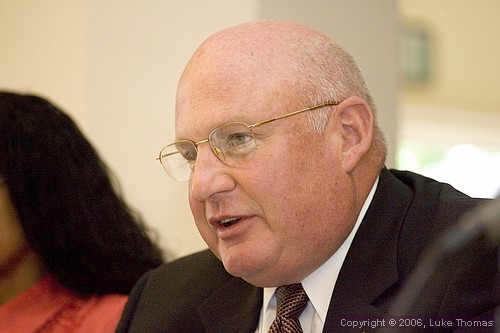
Tony Riberra
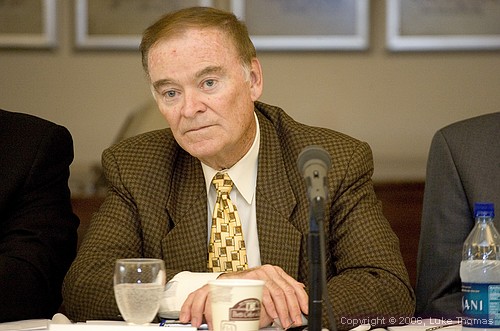
Frank Jordon
Panelists included Morgan Gorrano who focuses on police issues
arising before the San Francisco Civil Service Commission, former
State Judge Lillian Sing, San Francisco State University Journalism
Professor Yumi Wilson, John Dineen who serves as senior consultant
to the California Commission on Peace Officer Standards and Training,
former local FBI spokesman George Grotz, and former Northern California
District US Attorney Joseph Russoniello.
Responsibility for shaping police leadership is shared by several
offices. Likewise, impact on San Francisco policing extends to
community organizations and to the voters.
Civilian Review of the Police - San Francisco voters established
the Office of Citizens Complaints in 1982 with no opposition from
the POA. Observers contend the police union accepted civilian
review in return for no opposition to a measure increasing officer
benefits that appeared on the same ballot.
Both measures passed.
Some 80 cities now have civilian review although San Francisco
is unique in OCC authority to forward serious complaints of police
misconduct to the Police Commission for review. Less serious sustained
cases are adjudicated by the police chief with the power to suspend
an officer up to a maximum of 10 days. The Police Commission has
the authority to impose suspensions in excess of 10 days and officer
termination if necessary.
The OCC's authority to submit complaints directly to the Police
Commission over police chief objection has fostered mistrust and
a breakdown of communication between Police Chief Heather Fong
and the OCC.
Police Commission - The Police Commission has the authority
to sustain or reject officer discipline recommendations coming
from either the police chief, or from the OCC. It is empowered
to determine the scope of discipline.
Proposition H - San Francisco voters approved the police
reform measure under which the Police Commission and OCC have
operated since 2004. Prop H split Police Commission appointments
between the Board of Supervisors and the Mayor's Office. Previously,
the mayor appointed all police commissioners. The Board of Supervisors
now appoints three members to the police commission and the Mayor's
Office appoints four members. Commissioners appointed by the mayor
are subject to confirmation by supervisors.
Police Chief - The police chief has authority to suspend
officers for a maximum of ten days or recommend more severe punishment
to the Police Commission. The OCC contends complaints OCC forwards
to the Police Commission warrant punishment beyond the chief's
authority.
Extending police chief authority to mete out longer suspensions,
however, may require voter approval.
The Mayor - Although the mayor's authority over Police
Commission appointments was reduced by Proposition H, Mayor Newsom
holds the most powerful bully pulpit in San Francisco. Discontent
grows widespread with Newsom's reliance on broad consensus efforts
that result in no visible resolution to inter-departmental conflict.
A frustrated Supervisor Sophie Maxwell launched a separate attempt
to advance community policing through the Select
Committee on Ending Gun and Gang Violence. Supervisor Ross
Mirkarimi and community organizations joined District Attorney
Kamala Harris in forging community input apart from the Mayor's
Office.
The Board of Supervisors - The Board now holds de facto
control over Police Commission appointment through Board authority
to reject mayoral appointments to the Police Commission.
The Police Officers Association - The POA is well funded,
well organized, and characterized by some within the department
as actually running the department. It supports and opposes ballot
measures and office seekers in sometimes-strident alliances. Critics
of Mayor Newsom suggested Newsom has remained low-profile on police
reform out of political need for state peace officer backing should
Newsom run for higher office.
Those who impact policing - The District Attorney, the
Public Defender, the Sheriff, individual members of the Board
of Supervisors.
District Attorney Kamala Harris is criticized by some officers
as "cherry picking" cases for prosecution to maintain
a high conviction rate in order to seek higher office. Whether
true or not, prosecution failures impacts street crime reduction.
Harris was not invited as a panelist or asked to speak before
the panel. Nor were Supervisors, the Sheriff, or the Public Defender.
The panel held hearings on Tuesday and Thursday with Police Chief
Heather Fong first called to speak. She complained splitting discipline
authority impairs policing and cast doubt on OCC sincerity to
collaborate.
"It's a horrible feeling for me as the chief of the department
but I think the ramifications for the officers is even worse for
the officers.
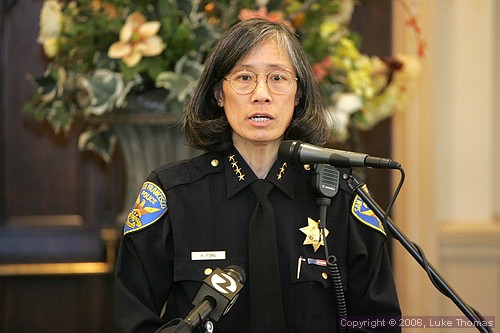
Heather Fong
"Just throwing it into the open arena because it is high
profile is not a fair process for the officers."
According to media accounts, officers are unwilling to cooperate
with the OCC, panelist Yumi Wilson noted.
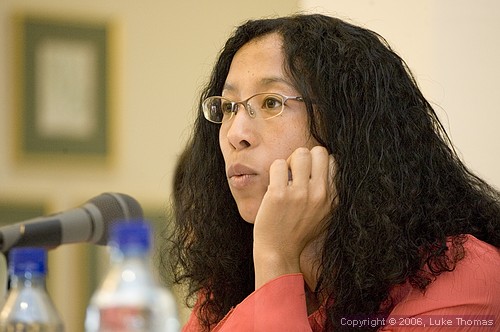
Yumi Wilson
"Well, the officers have the right to be represented by
someone from the Police Officers Association, or an attorney,"
Fong responded, adding response time to subpoenas or notice of
investigation are legally binding.
"On a quarterly basis we report to the commission so that
they know these are the types of inquiries that we have received,
these are the delayed responses, or these are the delayed delivery
of documents.
"The meet and confer process (with the OCC) is a process
that has to be fair.
"Filing charges when the meet and confer is not resolved,
or when we only get a part of the case file, isn't right."
Such disagreement has resulted in unproductive meet and confer
meetings.
Gorrano asked if Fong believes the OCC is fair and impartial.
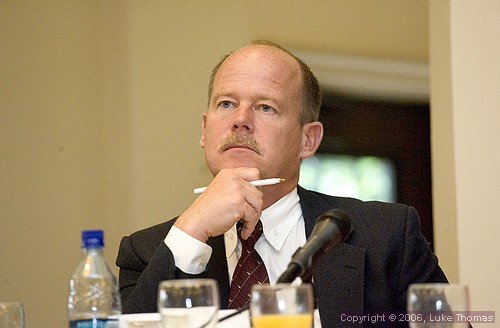
Morgan Gorrano
"I think that as the chief, as someone who has been in this
department for 29-plus years, I think when you bring something
forward and say the general orders say this - this is the way
something is supposed to work - and it's negated, or there's an
exaggeration about someone's criminal history record, I think
when facts like that are brought forward and then charges are
filed without me being notified… I have concerns about the
willingness to truly meet and confer," Fong responded.
"If the goal is not to talk about it and look at the reasons
to do something or not to do something, then why talk to me."
Fong said her own draft of protocols for investigating complaints
against officers will be submitted to the OCC and Police Commission
within two months.
The OCC refers few sustained complaints to the Police Commission,
OCC director Kevin Allen told panelists.
More than 1,000 citizen complaints are lodged with the OCC each
year, Allen stated.
From 70 to 100 of those complaints are sustained annually, he
detailed.
Citizen complaints are adjudicated using the 'preponderance of
evidence' legal standard based on the more convincing evidence
and its probable truth or accuracy, and not on the amount of evidence.
"People fear that the police cannot adequately police themselves,"
continued Allen.
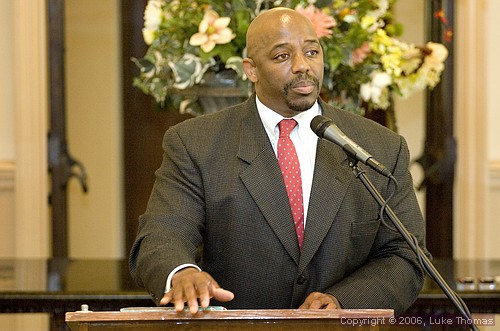
Kevin Allen
"Whether that's true or not, the perception of the public
and the rights of the public cannot be stepped on simply to preserve
rights of police officers in this City. Both sides have rights.
We are the independent agency that stands in the center, making
sure that process works as efficiently as possible.
"We protect the rights of the officers to the best of our
abilities. We protect the rights of the citizens to the best of
our abilities.
"We do our best to investigate matters in a thorough, accurate,
and efficient manner."
The Police Department has not released documents to the OCC in
a timely manner, Allen reported.
"A review of the office showed that documents... were not
turned over in a timely manner.
"We did not receive (Fajitagate) documents until six or
seven months after the complaint was lodged."
Allen reported that officers harass OCC staff.
"We have graffiti in our offices on tables. We have people
in full uniform hissing at our employees.
"There is nothing but contempt given to our investigators
and they have to deal with that on a daily basis.
"It is difficult for them to sit in a room with people who
don't like them and are openly contemptuous against them."
Russoniello attempted to frame the OCC as accepting complaints
outside charter mandate.
"Some bystander... makes a complaint. That person wouldn't
have any standing in court to make the complaint. You're telling
us that person has the right to make the complaint and you follow
up and do an investigation on it?" Russoniello asked.
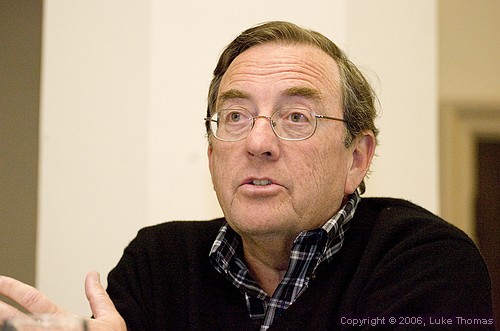
Joseph Russoniello
"We don't go around asking people to make complaints,"
countered Allen. "Under the charter we are mandated to investigate
all complaints."
Russoniello maintained, "The charter only says that you're
required to investigate complaints - it doesn't say every complaint
regardless of whether it has any legitimacy or not, does it?"
"It actually says that we are mandated to investigate all
complaints that fall within our jurisdiction and that would be
a complaint filed by a citizen as to perceived misconduct of the
San Francisco police," said Allen.
"I guess it's the perceived misconduct - the perception.
It's whose perception? Is the friend of the perpetrator, a bystander,
is that the point of view that determines whether or not you investigate?"
Russoniello pressed.
"It's the perception of the citizen and that's why our agency
was created," countered Allen.
"If somebody tells their friend 'I was arrested and they
took the wallet out of my pocket' and for whatever reason that
person who is arrested cannot complain instead of not having that
complaint come forward, instead of not having that issue addressed,
which could result in potential misconduct, the charter has allowed
for any citizen to make a complaint for us to do an investigation.
"The rules encourage citizens to bring their complaints
forward. It encourages people to bring forth anonymous complaints.
Why? Because we don't want to dissuade the public from coming
forward when they feel that there has been some kind of wrongful
act perpetrated on them, or another citizen, by a member of the
San Francisco Police Department.
"The frivolous nature of the complaint I understand, but
then again in whose perception is it frivolous?
"Our investigations have resulted in findings where money
has disappeared, or it might have been in a criminal investigation,
and just because of the nature of a person, that's what we hear
so often that 'there's these criminal defendants that are making
these complaints against a police officer' - it doesn't justify
somebody doing something that is a violation of the department
general orders.
"We think highly of police officers.
"I would only hope the police officers would understand
the function of our agency, the importance of our agency, as a
management tool, a tool that's there for the public to provide
the public with some kind of accountability and a feeling that
the police are actually out there working for them.
"I believe that's what the police are doing. I think it's
the perception that goes out to the public is skewing what the
public sees. Communication is the key and I will continue to talk
with everyone as long as I can until I can't talk any longer,"
Allen concluded.
POA president Gary Delagnes described the OCC as anti-police.
"The reality is the rank and file of the San Francisco Police
Department is demoralized," Delagnes asserted.
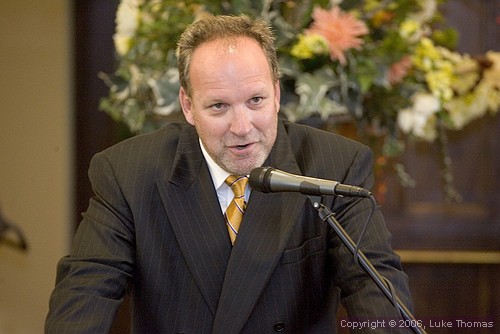
Gary Delagnes
"They have lost faith in the disciplinary system... they
obviously have no faith in the OCC's ability to effectively and
fairly operate.
"They see the Police Commission as purely a political body
whose only and number one objective seems to be discipline."
Officers who don't trust disciplinary procedures stop making
arrests, Delagnes stated.
"If the police officers don't trust the system then they
really hold all the cards," continued the POA president.
"Because what's going to happen is you're not going to get
the maximum performance from those police officers.
"This City had better take heed.
"Our arrests went from 58,000 to 36,000 arrests from 2003
to 2004.
"What does that tell you? They're doing less because they
fear the disciplinary process and that's a sad, sad day for the
citizens of San Francisco."
Offering a different view, Police Captain Paul Chignell noted
sardonically that police morale had been characterized at its
lowest with every high profile officer incident since the 1970s.
And Chief Fong should communicate with her staff more frequently,
Chignell suggested
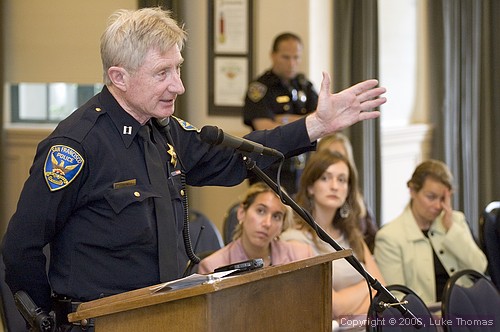
Paul Chignell
There also was a failure of communication among voters who approved
Prop H expansion of OCC authority and split Police Commission
appointments between the Mayor's Office and the Board of Supervisors,
stated Police Commission vice president Theresa Sparks.
"Unfortunately when it was sold to the public the expectations
were raised significantly that all of sudden there would be this
overall civilian oversight group which would be able to do things
like look directly into the controversy between the OCC and the
department, and make some kind of analysis, to do its own analysis
on staffing, to do its own analysis of general orders, to write
general orders, to amend general orders, to do the various sundry
things we are charged by the charter to do.
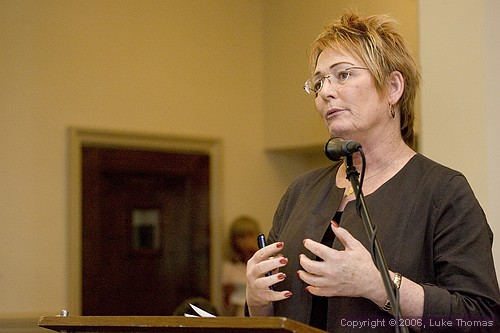
Theresa Sparks
"Unfortunately, there are seven volunteer commissioners
and there are two staff - one a police sergeant and one a clerical
person.
"We don't have the ability to meet the expectations of the
public.
"In addition, I think both the department and the OCC are
frustrated with us because they're saying 'you take care of the
other body, you have jurisdiction over the other body, why aren't
you doing something?'
"Well, if we had the ability to do some analysis we might
just do that."
Sparks appeared before the panel with Police Commission president
Louise Renne whom Sparks opposed for re-election to that post.
The POA and OCC have not met to work out differences as requested
by the Police Commission, Renne said.
"We had both the director of the OCC and a representative
of the POA come and testify before us at exactly the same time,"
recalled Renne.
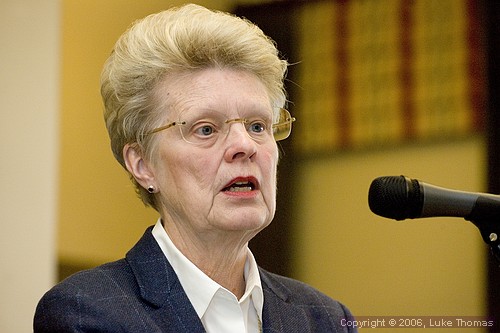
Louise Renne
"We suggested as a result that the POA and the OCC sit down
and see if they couldn't get a better understanding of why, allegedly,
the POA was not understanding what the charges were."
No such meeting had occurred by last Thursday.
Allen Nance, director of the Mayor's Office of Criminal Justice,
represented Mayor Gavin Newsom before the panel.
Ribera asked Nance, "Does the mayor have the leadership
to solve the problems between the OCC, SFPD etc?"
Nance conceded a lack of communication; trust and dialogue are
significant concerns, but sidestepped Ribera's implication by
floating an idea for a future criminal justice summit.
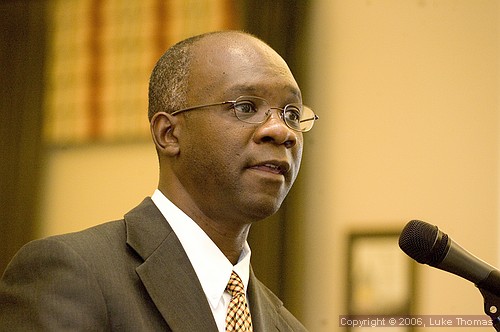
Allen Nance
"Where is the will or document that lays out a game plan
to bring the departments together?" Grotz asked.
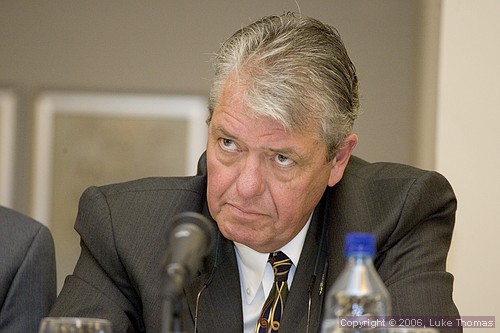
George Grotz
Nance responded saying, "a document will be produced by
the end of summer laying out a game plan."
ACLU spokesman Mark Schlossberg, Director of the Northern California
Police Policies Project, noted the panel speakers invitees lacked
community-based representation.
"Any recommendations of this panel will find limited acceptance
by the public," predicted Mark Schlossberg, director of the
Northern California Police Policies Project.
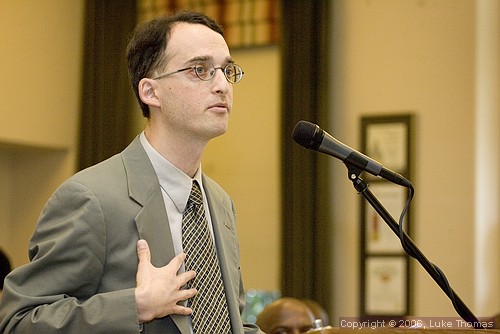
Mark Schlossberg
Significant voices such as the Public Defender, the District
Attorney, the Sheriff, and community organizations were not included
as panelists nor invited to speak, Schlossberg explained.
Many of the missing voices cited by Schlossberg will participate
in a June 7 forum on community police slated at the Ella Hill
Hutch Community Center. The forum is an offshoot of frustration
Supervisors Sophie Maxwell and Ross Mirkarimi express toward leadership
inertia.
Among several recommendations, Schlossberg recommended increased
funding for the Police Commission, to be used to hire two independent
policy analysts and an Executive Director. OCC staffers contend
OCC drafted policy recommendations dating back to 1998 remain
unnoticed by the Police Commission.
"The Police Commission needs resources to do its job",
cited Schlossberg.
Schlossberg also recommended greater transparency over the disciplinary
process - access to police records, knowledge of sustained police
misconduct, and a summary of complaints made available to the
public.
He also said he would support increased powers for the police
chief as long as transparency is maintained and OCC oversight
is not impinged.
Speaking to the contentious relationship between the POA and
the OCC, Schlossberg said, "In an ideal world the POA would
accept the legitimacy of the OCC."
Confusion among officers is more of a problem than distrust of
disciplinary procedures, surmised the man who trains police cadets.
"There's more confusion than distrust among the rank and
file," Police Captain Dan Lawson told the panel. Lawson serves
as Director of Training for the San Francisco Police Academy.
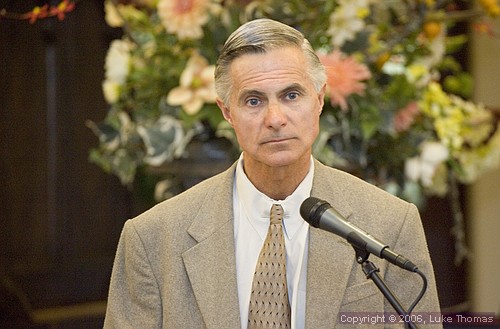
Dan Lawson
"There's no uniform management," continued Lawson.
"We don't have a leadership culture. The POA has been playing
a role in that culture" and there is a "lack of vision
in leadership training,"
Politics suppress clear-cut leadership as leaders hide their
faces, LGBT Police Officers Association president Lea Milittello
raised her voice.
"Politics has become the fuel that is propelling the train
forward," argued Militello.
"Politics is involved in every aspect of the decision making
process.
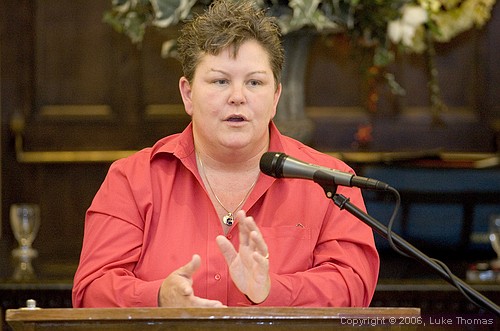
Lea Milittello
"We've gotten away from community policing because we have
staffing issues. We cannot force effective community policing
in this city until we address the staffing shortages. We have
new communities like Mission Bay but we have staffing levels dating
back to 1993.
"I have never seen our department so dysfunctional than
it is today."
"We all need to work together for common goals.
"We need to see the faces of our leaders."
The panel will issue recommendations within 60 days, co-chair
Ribera announced as the forum ended.
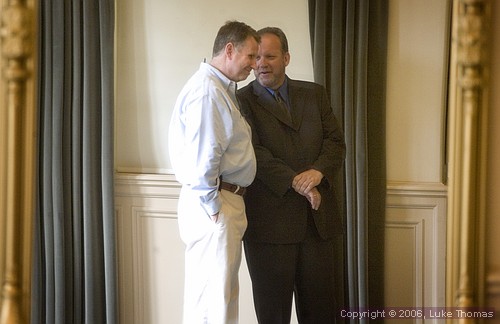
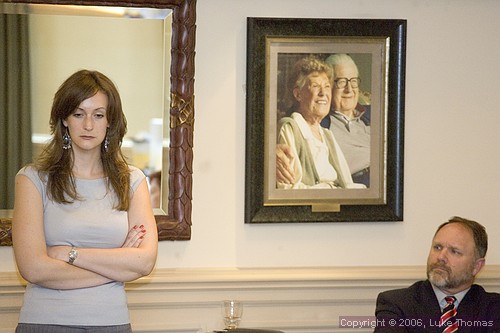
####
|